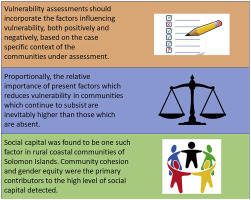当前位置:
X-MOL 学术
›
Ocean Coast Manage.
›
论文详情
Our official English website, www.x-mol.net, welcomes your feedback! (Note: you will need to create a separate account there.)
Social capital reduces vulnerability in rural coastal communities of Solomon Islands
Ocean & Coastal Management ( IF 4.6 ) Pub Date : 2020-06-01 , DOI: 10.1016/j.ocecoaman.2020.105186 Willem Malherbe , Warwick Sauer , Shankar Aswani
Ocean & Coastal Management ( IF 4.6 ) Pub Date : 2020-06-01 , DOI: 10.1016/j.ocecoaman.2020.105186 Willem Malherbe , Warwick Sauer , Shankar Aswani

|
Abstract Rural island communities are generally regarded as the most vulnerable groups affected by climate change. This perception arises due to them often being in less developed areas with high levels of exposure to stressors, while reportedly lacking the means to cope with these stressors. Studies which use developed-country yardsticks, such as those used in past IPCC-based assessments, when measuring vulnerability in less developed states will however inevitably over-pronounce its effects in such areas. The sustainable livelihoods approach provides an alternate means of determining vulnerability using capital assets such as social capital. The presence of these assets enables communities to pursue diverse livelihood strategies which ultimately serve to reduce their vulnerability. This study seeks to measure attributes of social capital in five marine dependent communities of Solomon Islands. This was done through a questionnaire survey of 110 respondents, which comprised of 15 questions related to social capital. Question scores were equally balanced and also contributed equally to each of the five indicators of social capital identified in the literature-namely community cohesion, gender equity, leadership, decision making, and equal access to services and resources. The results indicated an overall social capital vulnerability score of 0.379, where 0 indicates the lowest possible vulnerability score and 1 the most vulnerable. Community cohesion decreased vulnerability the most within these communities, followed by gender equity, leadership, equal access to services and resources and decision making. Our results indicate a high degree of social capital in Solomon Islands communities, and therefore its importance as an inherent measure for households to cope with both climate and non-climate related stressors. Climate change directed policy should therefore be developed with the aim of preserving social capital as it provides a culturally embedded means of deterring vulnerability, at the risk of more expensive and possibly less pragmatic alternative measures.
中文翻译:

社会资本降低所罗门群岛沿海农村社区的脆弱性
摘要 农村海岛社区普遍被认为是受气候变化影响最脆弱的群体。之所以产生这种看法,是因为他们通常处于欠发达地区,压力源的暴露程度很高,而据报道,他们缺乏应对这些压力源的手段。然而,在衡量欠发达国家的脆弱性时,使用发达国家标准(例如过去基于 IPCC 的评估中使用的标准)的研究将不可避免地夸大其在这些领域的影响。可持续生计方法提供了另一种使用社会资本等资本资产来确定脆弱性的方法。这些资产的存在使社区能够追求多样化的生计战略,最终有助于降低其脆弱性。本研究旨在衡量所罗门群岛五个依赖海洋的社区的社会资本属性。这是通过对 110 名受访者的问卷调查完成的,其中包括 15 个问题与社会资本有关。问题得分同样平衡,并且对文献中确定的社会资本的五个指标中的每一个指标也有同等贡献,即社区凝聚力、性别平等、领导力、决策以及平等获得服务和资源。结果表明,总体社会资本脆弱性得分为 0.379,其中 0 表示可能的最低脆弱性得分,1 表示最脆弱。社区凝聚力降低了这些社区内的脆弱性,其次是性别平等、领导力、平等获得服务和资源以及决策。我们的结果表明所罗门群岛社区具有高度的社会资本,因此它作为家庭应对气候和非气候相关压力的内在措施的重要性。因此,气候变化导向政策的制定应以保护社会资本为目标,因为它提供了一种文化嵌入的遏制脆弱性的手段,冒着采取更昂贵且可能不太实用的替代措施的风险。
更新日期:2020-06-01
中文翻译:

社会资本降低所罗门群岛沿海农村社区的脆弱性
摘要 农村海岛社区普遍被认为是受气候变化影响最脆弱的群体。之所以产生这种看法,是因为他们通常处于欠发达地区,压力源的暴露程度很高,而据报道,他们缺乏应对这些压力源的手段。然而,在衡量欠发达国家的脆弱性时,使用发达国家标准(例如过去基于 IPCC 的评估中使用的标准)的研究将不可避免地夸大其在这些领域的影响。可持续生计方法提供了另一种使用社会资本等资本资产来确定脆弱性的方法。这些资产的存在使社区能够追求多样化的生计战略,最终有助于降低其脆弱性。本研究旨在衡量所罗门群岛五个依赖海洋的社区的社会资本属性。这是通过对 110 名受访者的问卷调查完成的,其中包括 15 个问题与社会资本有关。问题得分同样平衡,并且对文献中确定的社会资本的五个指标中的每一个指标也有同等贡献,即社区凝聚力、性别平等、领导力、决策以及平等获得服务和资源。结果表明,总体社会资本脆弱性得分为 0.379,其中 0 表示可能的最低脆弱性得分,1 表示最脆弱。社区凝聚力降低了这些社区内的脆弱性,其次是性别平等、领导力、平等获得服务和资源以及决策。我们的结果表明所罗门群岛社区具有高度的社会资本,因此它作为家庭应对气候和非气候相关压力的内在措施的重要性。因此,气候变化导向政策的制定应以保护社会资本为目标,因为它提供了一种文化嵌入的遏制脆弱性的手段,冒着采取更昂贵且可能不太实用的替代措施的风险。


























 京公网安备 11010802027423号
京公网安备 11010802027423号